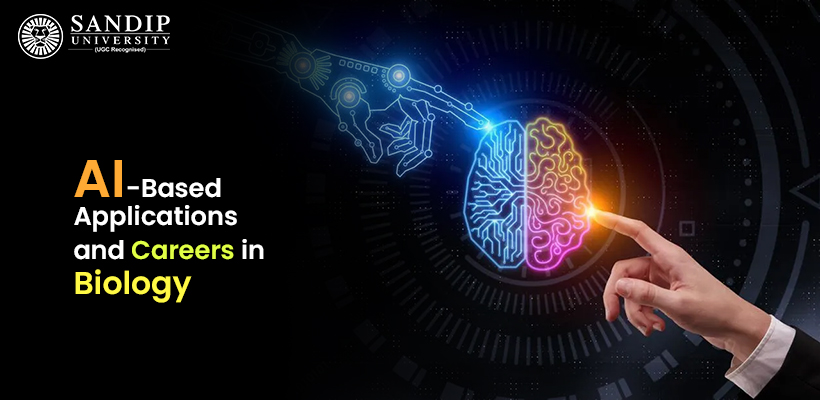Biology is considered as science which has drawn traditions from various practices in medicine and natural history. The origin of medicine dates back to 460 B.C.E. when ancient Greeks show involvement in unravelling anatomy and physiology of plants and animals. The ecology and taxonomy were studied during 384-322 B.C.E. by Aristotle and his students.
The significant developments in biological sciences however took place in the late eighteenth and early nineteenth century. However, biology is considered as the most progressive science in the last five decades because of the advent of technologies. The breakthrough particularly in medicine has provided solutions to many fatal health concerns.
AI (Artificial Intelligence) and computer science are related fields but have distinct differences. The primary objective of AI is to develop intelligent systems that can perform tasks traditionally requiring human intelligence, such as natural language processing, computer vision, problem-solving, decision-making, and pattern recognition.
AI finds applications in numerous domains, such as healthcare, finance, gaming, robotics, virtual assistants, autonomous vehicles, recommendation systems, and fraud detection. It aims to create intelligent systems that can automate tasks, enhance decision-making, and provide personalised experiences.
Bridging biology and computer science involves the integration of principles, techniques and tools from both fields to address complex biological problems and develop innovative solutions. This interdisciplinary approach, often referred to as computational biology or bioinformatics, has become increasingly important as biological data has exploded in volume and complexity.
Computer science techniques, such as algorithms, data mining, machine learning, and statistical modelling are used to analyse DNA sequences, identify genes, predict protein structure and functions and understand biological systems. The recent applications in the biotechnology domain are mentioned here.
1. DNA Sequencing: This technique allows understanding genes by generating vast amounts of raw generic data. AI algorithms can be employed to process and analyse this data, enabling researchers to identify genetic variations, disease causing mutations and potential drug targets. Machine learning algorithms can learn patterns from existing genomic databases and apply that knowledge to interpret newly sequenced genomes.
2. Genomic Medicine and Precision Healthcare: AI can assist in personalised medicine by leveraging DNA sequencing data. By integrating genomic data with patient health records, AI algorithms can identify genetic predispositions to diseases, predict treatment responses, and provide tailored healthcare recommendations.
3. Drug Discovery and Development: AI techniques, such as machine learning and deep learning, can be applied to large-scale genomic datasets to identify potential drug targets. By analysing genetic data from diseased individuals, AI algorithms can prioritise genes or proteins that play a crucial role in disease pathways, aiding in the discovery of novel therapeutic targets.
4. Clinical Diagnostics: AI algorithms can be trained on large genomic datasets to assist in diagnosing genetic diseases. By comparing an individual’s DNA sequence to reference genomes, AI systems can identify disease-causing mutations or genetic variations that contribute to specific conditions.
5. Gene Editing: AI can also facilitate the development of gene-editing technologies like CRISPR. By analysing genomic data, AI algorithms can predict the outcomes of gene editing experiments and optimise the design of guide RNAs for precise and efficient gene editing.
In summary, the integration of DNA sequencing and artificial intelligence has significantly accelerated progress in genomics research, personalised medicine, drug discovery, and clinical diagnostics. AI algorithms enable efficient analysis and interpretation of vast amounts of genetic data, leading to improved understanding of genetic diseases and the development of tailored treatment strategies.
Bioinformatics being a rapidly growing field combines biology, computer science, and statistics to analyse and interpret biological data. Though there are various job roles and positions available in the field of bioinformatics based on a student’s expertise and interest. The most common job titles are as follows:
1. Bioinformatics Scientist: As a bioinformatics scientist, you would be responsible for designing and implementing computational algorithms and tools to analyse biological data.
2. Computational Biologist: Computational biologists focus on applying computational techniques to solve biological problems. They develop and use algorithms and software to analyse and interpret biological data, such as DNA and protein sequences, gene expression data and protein structures.
3. Genomics Analyst: Genomic analysts specialise in analysing genomic data, such as DNA sequencing and microarray data. They use various bioinformatics tools and statistical methods to identify variations, study gene expression patterns and investigate the relationship between genotype and phenotype.
4. Clinical Bioinformatics Specialist: Clinical bioinformatics specialists work at the intersection of bioinformatics and clinical research. They analyse genomic and clinical data to identify genetic markers associated with diseases, predict treatment responses and assist in personalised medicine initiatives.
5. Data Scientists in Bioinformatics: Data Scientists in bioinformatics apply machine learning and data mining techniques to analyse large scale biological databases.
6. Research Scientist in Computational Biology: They focus on developing novel computational approaches to answer biological questions. They design experiments, analyse data and collaborate with experimental biologists to gain insights into biological systems.
Besides these job opportunities do exist in academia, research institutes, pharmaceutical companies, biotechnology firms, healthcare organisations and government agencies.
Sandip University is one of the best engineering colleges in Nashik that offers cutting-edge undergraduate and postgraduate programs in AI and various sciences to create the next generation of skilled scientists in these fields. Students at Sandip University are trained by highly qualified faculty members in modern classrooms and laboratories.
Skill-building and knowledge enhancement is the main goal of these programs at Sandip University. Students also receive 100% placement assistance to enhance their career prospects in the field of their choice. So, if you are interested in making a career in AI or sciences then do visit Sandip University’s vibrant campus to make the right decision regarding your education and career.

